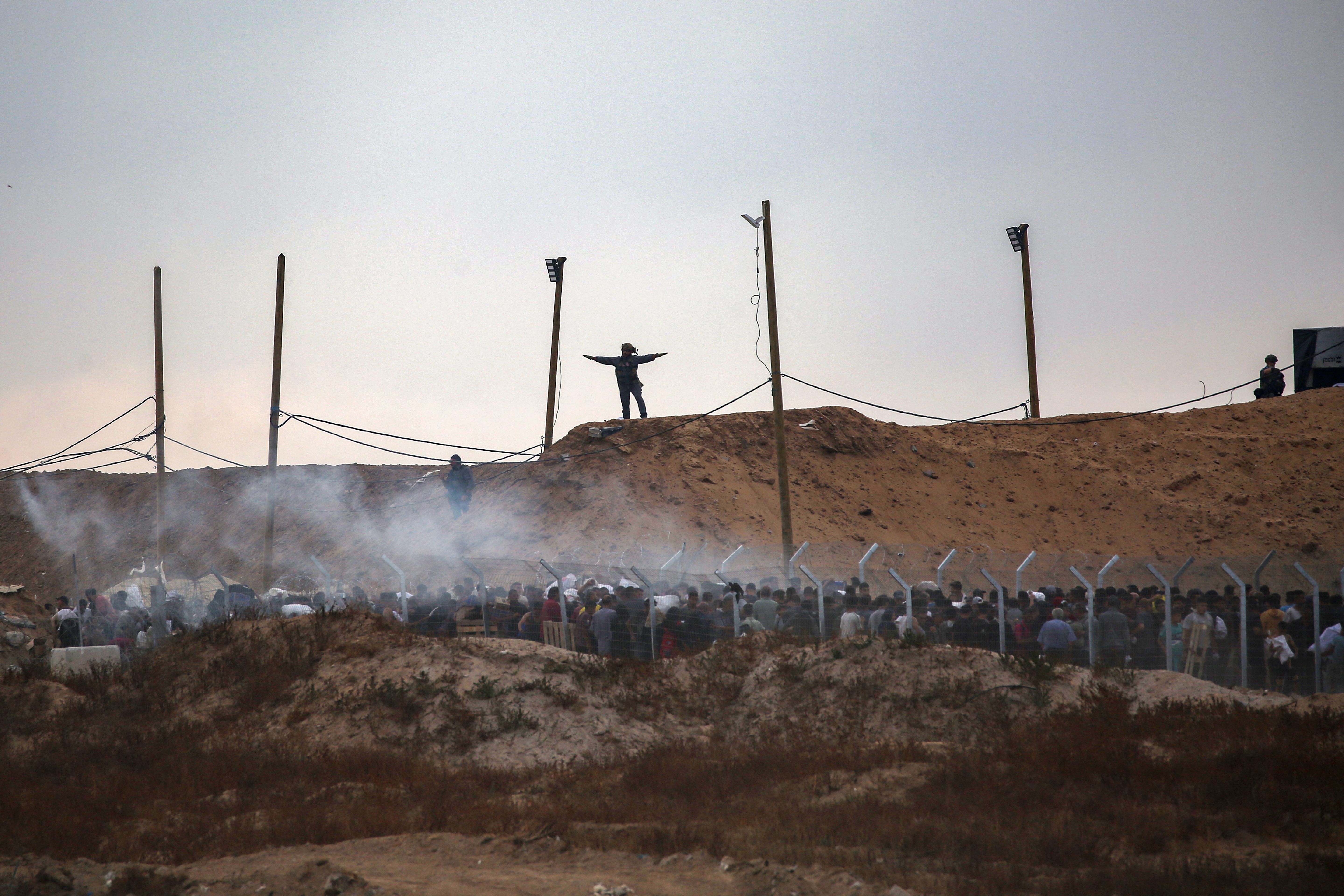Beirut and Baghdad are both watching how the other seeks to give the state a monopoly of weapons.
Hasan Hamra
{
"authors": [
"Michael Young"
],
"type": "commentary",
"blog": "Diwan",
"centerAffiliationAll": "",
"centers": [
"Carnegie Endowment for International Peace",
"Malcolm H. Kerr Carnegie Middle East Center"
],
"collections": [
"Rebuilding Gaza: The Human Dimension"
],
"englishNewsletterAll": "",
"nonEnglishNewsletterAll": "",
"primaryCenter": "Malcolm H. Kerr Carnegie Middle East Center",
"programAffiliation": "",
"programs": [],
"projects": [],
"regions": [
"Palestine",
"Israel"
],
"topics": []
}
In an interview, Alex de Waal discusses Israel’s use of food as a weapon of war in Gaza, and its repercussions.
Alex de Waal is executive director of the World Peace Foundation, which is affiliated with the Fletcher School of Law and Diplomacy at Tufts University in Boston. He has worked on issues of famine, humanitarianism, and conflict since the mid-1980s. Among his books is Mass Starvation: The History and Future of Famine (Polity Press, 2017), and he has analyzed the humanitarian catastrophe in Gaza for the London Review of Books. Diwan interviewed De Waal this week to discuss his publicly stated views on Israel’s policy of restricting the entry of food to Gaza, and the broader implications of this.
Michael Young: In a recent interview with Democracy Now, you stated that in over 40 years of your working on famine, food crises, and humanitarian action, “there’s no case of such minutely engineered, closely monitored, precisely designed mass starvation of a population as is happening in Gaza today.” Can you break this down for us and explain what makes you say what you did?
Alex de Waal: Let’s look at the recent history of famines. Mass starvation in Sudan, South Sudan, Somalia, Ethiopia (Tigray), Syria and Yemen—all of them man-made, all of them in which hunger has been used as a weapon of war—have been larger in magnitude, that is, in terms of the number of people affected or who have perished, than Gaza. Some of these have had a similar severity of starvation—for example the starvation in and around Al-Fasher in Sudan today.
The humanitarian catastrophe in Gaza today is unique, however, in that the situation can be remedied overnight if Israel chooses to do so. Within an hour’s drive of the stricken communities there are the United Nations and other aid organizations, with the resources, skills, plans, networks, and so on, to stand up a comprehensive humanitarian operation. If Israeli Prime Minister Benjamin Netanyahu were to decide that every child in Gaza should have breakfast tomorrow, it could be done. By way of comparison, when polio was detected in Gaza a year ago, Israel facilitated a comprehensive vaccination program rapidly and effectively.
Israel controls every shipment of assistance that goes into Gaza. It decides where people can live and when they must move. It inspects every commodity. It controls the water supply and the electricity. It monitors every aid shipment and regularly fires upon aid givers and people seeking aid. The Gaza Humanitarian Foundation (GHF), the controversial U.S.- and Israeli-backed organization established to deliver aid to Gaza, has four ration stations that are open for very specific hours. Those hours are announced at a time of Israel’s choosing, so that people have to be on standby, nearby, for those announcements. This is an extraordinarily rigorous and detailed control over the essentials of life. And there is no sense in which this is unforeseen. Israel knows what it is doing.
MY: Another point you made in your interview was that this situation in Gaza was predictable. Specialists had warned for months about starvation, yet nothing was done to prevent it. Why is this the case, and why is this not provoking more than pro forma reactions in many Western countries, who otherwise often portray themselves as the paramount defenders of human rights and humanitarian values?
AdW: The crime of starvation has an important feature that distinguishes it from other war crimes. A pilot can bomb a hospital by accident. He may have incorrect information or make a mistake and once the bomb is released it cannot be recalled. But a military commander cannot starve a population by accident. It takes weeks to starve. During that time, information is available about the outcome. In the case of Gaza, authoritative warnings of the outcome have repeatedly been provided by the UN and the United States’ Famine Early Warning Systems Network. This situation was foreseeable and was foreseen. An ironic testament to this is that in March–May 2024, when the U.S. government pressured Israel to permit humanitarian aid into Gaza so as to prevent the situation from crossing the threshold at which the UN would determine “famine,” Israel permitted increased aid, and the situation improved marginally. So, on occasion, enough was done to prevent it from passing this somewhat arbitrary, arcane threshold. But in the meantime, a catastrophic humanitarian emergency continued. “Famine” is not a binary: Just because things were marginally short of famine didn’t mean that it was anything other than a catastrophic situation of life.
MY: You’ve pointed out that not enough food is entering Gaza and that people are risking their lives to access the inadequate amounts of food provided. Your conclusion is that Israel is deliberately causing this situation. What is its purpose in doing so?
AdW: I cannot speak directly to Israeli intentions. But I can say that the mode of operation of the GHF, alongside continued restrictions on other forms of humanitarian assistance and attacks on aid workers and aid infrastructure, is consistent with a plan to forcibly relocate the population either to small zones that former Israeli prime minister Ehud Olmert has described as “concentration camps,” or remove them from Gaza altogether. In the meantime, the combination of weaponized starvation and weaponized rations is tearing apart Gaza’s social fabric, degrading and dehumanizing the people there.
MY: Do you believe a genocide is taking place in Gaza?
AdW: On March 28, 2024, the International Court of Justice issued a provisional order instructing Israel to provide a full spectrum of assistance, immediately, unhindered, in full cooperation with the UN. Justice Aharon Barak, the Israeli judge nominated to sit on the court, also voted for that, making the decision unanimous. The court voted overwhelmingly—14-2 and 15-1 on slightly different measures—that providing such assistance was an obligation under the Genocide Convention, implying that should Israel fail to do so, it would not be respecting its obligation to prevent genocide. As you know, Israel has not fulfilled these obligations.
The Genocide Convention is, first and foremost, a convention to prevent genocide. The question of whether there is or is not genocide is secondary to the question of whether Israel and other states that are party to the Genocide Convention are fulfilling their obligations to prevent genocide. They are not doing so.
MY: Zooming out a bit, how would you situate Gaza in the broader context of global power relations since the end of the Cold War? Is it unique situation that will have a fundamental impact on relations between “the West and the rest,” or is it a situation that will be forgotten once the fighting is brought to an end?
AdW: For 40 years there has been a liberal humanitarian order, anchored at the United Nations, funded mostly by the United States and the Europeans. That order had its critics (and I am among them). However, it was associated with a historic decline in the number and lethality of famines. Today, that order has been toppled. The funding has been massively cut, especially in the United States but also in Europe. The institutions have been assaulted, and along with the gutting of the U.S. Agency for International Development, the attack on the United Nations Relief and Works Agency (UNRWA) is the most egregious case. The informational order is being damaged along with the institutions, so that the UN and U.S. humanitarian early warning systems are severely handicapped. Perhaps, most significantly, the norms and principles are being shredded. Liberal humanitarianism is being replaced by various sorts of assistance programs that are aligned with military, nationalistic, and other narrow goals. This is most clearly seen in the case of the GHF, an experiment in militarized rationing under the banner of “humanitarianism.” Where the GHF leads, others will likely follow.
MY: Given the political pressures, particularly from the United States, on the International Court of Justice and the International Criminal Court, do you see a situation in which the perpetrators of this famine in Gaza will ever face justice?
AdW: Justice can take many forms. It doesn’t need to be a conviction in a court. There is a whole suite of transitional justice measures available—from apologies and memorialization, through restitution and reparations, to guarantees of non-recurrence. At the center of these is allowing the survivors to regain their dignity and self-respect, ensuring that their suffering is recognized and their future rights are respected.
In the court of world opinion, a verdict is being handed down every day: the government of Israel is responsible for inhumanities that will scar their state for a long time, perhaps forever.
Beirut and Baghdad are both watching how the other seeks to give the state a monopoly of weapons.
Hasan Hamra
The country’s leadership is increasingly uneasy about multiple challenges from the Levant to the South Caucasus.

Armenak Tokmajyan
The U.S. is trying to force Lebanon and Syria to normalize with Israel, but neither country sees an advantage in this.

Michael Young
The objective is to lock Hamas out of political life, but the net effect may be negative indeed.

Nathan J. Brown
The negotiator will have a delicate task of preserving Lebanon’s eroding sovereignty and getting on with Nabih Berri.

Michael Young